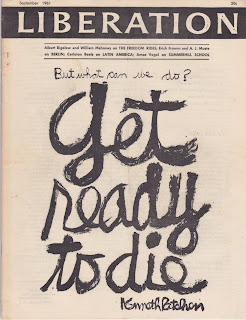 |
| the Pentagon's War Room, as envisioned in "Doctor Strangelove" |
Yesterday a friend asked, “How does it feel to be 70?”
I’m mainly astonished.
I turned 30 in 1971 and was very surprised to have lived that long.
Through much of the fifties and sixties, nuclear war seemed extremely likely -- a maybe-today-or-tomorrow event. For years I had expected few people would be alive in 1971, with no chance of survival for those of us living in high-priority target areas like New York and Washington.
I’m not old enough to remember Hiroshima and Nagasaki, but in the fifties there were the frequent open-air explosions of nuclear weapons in the Nevada desert as well as on various Pacific islands and remote areas of the USSR. No one in the northern hemisphere wasn't exposed to fallout. As a kid watching many of the blasts on television -- truly a theater of the Apocalypse -- I didn’t feel at all confident about the human future.
For a school project in the eighth grade, using a cardboard tube plus cotton and spray paint, I made a foot-high model of the mushroom cloud produced by an atom blast,
In high school, as a member of the school debating club, I gave a talk that had the title “Generation in the Shadow.” The shadow looming over us, I argued, was the mushroom cloud.
In 1960-61, while part of a Navy unit at the US Weather Bureau just outside of Washington, one of our regular exercises was to plot fallout patterns in the event a 20-megaton nuclear weapon to explode today over the capital. The drill made readiness for nuclear war very real.
Out of the Navy and part of the Catholic Worker community in New York, I tacked up a cover of Liberation magazine on the wall of my room that reproduced poet Kenneth Patchen’s brush-stroke calligraphy, “Get ready to die.” Sobering.
In those years, millions of school kids took part in duck-and-cover exercises. The entire city of New York along with many other cities had compulsory annual drills to prepare for nuclear attack. Year after year Dorothy Day was among those arrested for refusing to take part, sitting instead on a park bench in front of City Hall. Across the US, suburban families were encouraged to build bomb shelters in their basements or underground in their backyards.
In October 1962, there was the Cuban Missile Crisis. I doubt any adult lived through that week without the awareness he or she might become radioactive dust before nightfall. For a lot of people, probably including many atheists, it was truly a week of prayer.
In recent years we’ve come to know more and more about the many instances since 1945 when nuclear weapons were almost used. It’s remarkable we have lived to tell the tale.
Nor is the danger purely in the past tense. Far from it.
I feel like a survivor living in the world of Doctor Strangelove.
For more than half a century, the surprise of a World War III not yet having happened has given me a sense of every day being extra.
Having survived to celebrate my 70th birthday has also renewed my awareness that the efforts made by so many people (not only anti-nuclear campaigners but people in government and the military who might have pushed the button but didn’t) to protect the world we live in really do matter. Meager, yes, but not inconsequential.
Strangelove director Stanley Kubrick was one of the life savers. Thank you, Stanley.
I really can say, and not just to myself, “Happy birthday.”
-- Jim


1 comment:
We are of a generation -- I turned 70 last year, and grew up with
Mid the yuccas and the thistles
I'll watch the guided missiles
while the old FBI watches me
I'll have on my sombrero
and of course I'll waer a pair o'
Levi's over my lead BVDs.
I didn't know what BVDs were, but I could imagine. But when I was 20 or 21 I found the only shop in South Africa that sold Levis, and bought a pair - straight off the top of the bale, all squashed flat. And the guy said, get two sizes bigger -- they shrink.
Now Levis are as kitsch as everything else, pre-faded, pre-patched, pre-torn, pre-shrunk, and produced in some sweatshop in the Far East. I wouldn't touch them with a bargepole. Is that what it's like to be 70?
Post a Comment